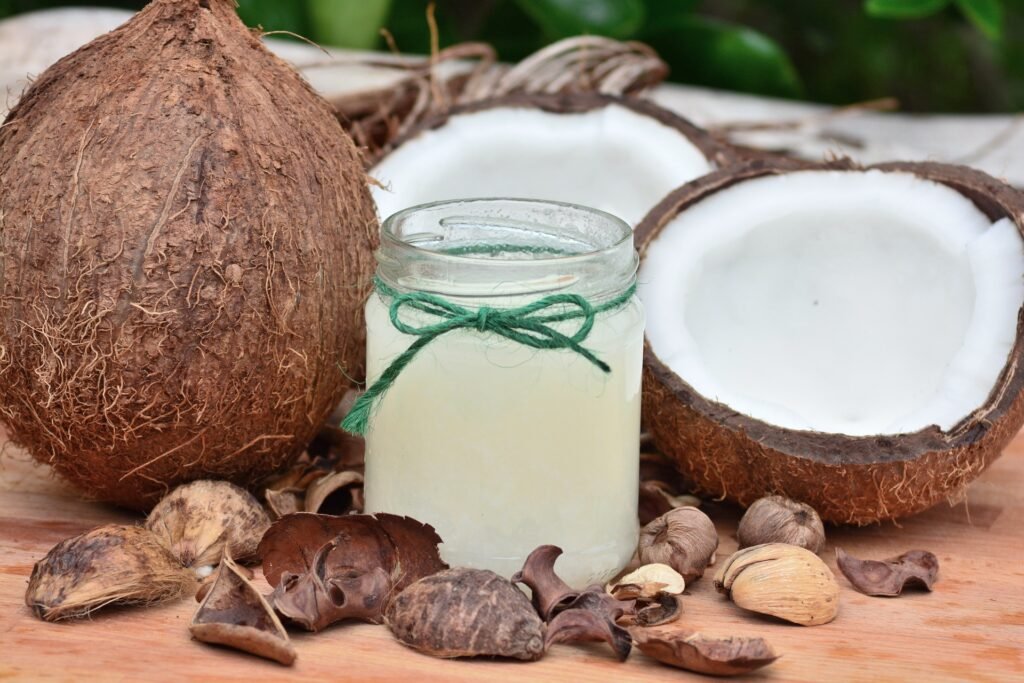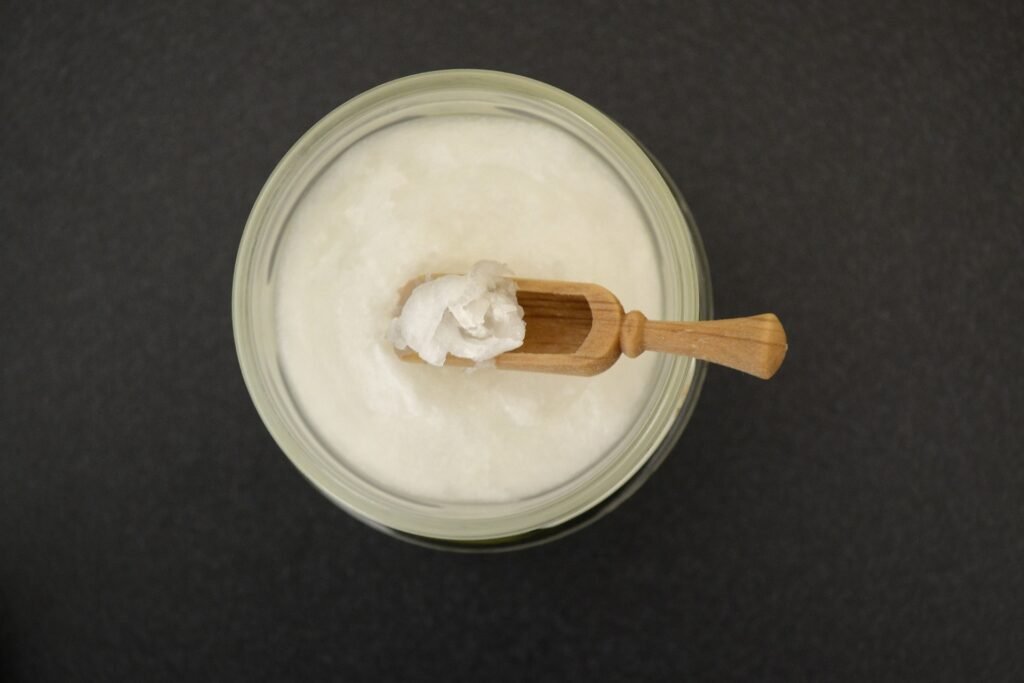This post may contain affiliate links which means I may receive a commission from purchases made through links at no additional cost to you. I greatly appreciate your support! Learn more on my privacy policy page.
Cooking with coconut oil has become increasingly popular in recent years, and for good reason. Not only does it add a deliciously unique flavor to dishes, but it also boasts a wide range of health benefits.
Coconut oil has proven to be a versatile and nutritious cooking ingredient, improving digestion and promoting weight loss.
We will explore ten reasons why cooking with coconut oil should be your new obsession.
Get ready to ditch the traditional cooking oils and switch to this tropical delight!

Table of Contents
1) Understanding the Basics: What is Coconut Oil?
Coconut oil has recently become a versatile cooking ingredient, but what exactly is it? Coconut oil is derived from the flesh of mature coconuts.
The oil is extracted through a process called cold-pressing, which involves minimal processing and retains the coconut’s natural nutrients and flavors.
Coconut oil’s key component is its high concentration of medium-chain fatty acids (MCFAs), specifically lauric acid. MCFAs are easily absorbed by the body and quickly converted into energy.
Lauric acid also has antimicrobial and antiviral properties, making coconut oil a powerful ingredient for boosting the immune system.
One important thing to note about coconut oil is its high saturated fat content.
While saturated fats have been demonized in the past, recent research has shown that the type of saturated fat found in coconut oil, known as lauric acid, may have different effects on the body than other saturated fats.
Some studies suggest that lauric acid may increase the levels of good cholesterol (HDL) in the body.
Coconut oil also has a high smoke point, which means it can withstand high temperatures without breaking down and releasing harmful compounds. It makes it an excellent choice for frying, sautéing, and baking.
2) Nutritional Benefits of Coconut Oil
Coconut oil isn’t just a delicious cooking ingredient with impressive nutritional benefits. First and foremost, coconut oil is packed with healthy fats.
While coconut oil contains saturated fat, most of the fats are medium-chain triglycerides (MCTs).
These MCTs are metabolized differently in the body than long-chain fatty acids. They are known to increase energy expenditure and promote weight loss.
In addition to its healthy fat content, coconut oil is an excellent source of antioxidants.
These potent compounds help protect the body against oxidative stress and inflammation linked to chronic diseases such as heart disease and diabetes.
Another notable benefit of coconut oil is its ability to support brain health. The MCTs in coconut oil can be easily converted into ketones, which serve as an alternative fuel source for the brain.
It makes coconut oil a valuable tool for individuals following a ketogenic or low-carb diet.
Coconut oil is also known for its antimicrobial and antibacterial properties. Lauric acid, one of the main fatty acids found in coconut oil, has been shown to help kill harmful bacteria and viruses in the body.
Lastly, coconut oil has been shown to improve nutrient absorption. Certain fat-soluble vitamins and minerals require the presence of fat to be properly absorbed by the body.
Adding coconut oil to your meals can help maximize the absorption of these nutrients.
From healthy fats to antioxidants and antimicrobial properties, coconut oil can benefit your health and well-being. So embrace the wonders of coconut oil and make it a staple in your kitchen!
3) The Impact of Cooking with Coconut Oil on Your Health
Cooking with coconut oil can significantly impact your health in numerous ways.
Firstly, the medium-chain fatty acids (MCFAs) found in coconut oil can help boost your metabolism and increase energy expenditure, leading to weight loss and improved body composition.
Additionally, coconut oil has been shown to raise good cholesterol (HDL) levels, improving heart health and reducing the risk of cardiovascular diseases.
The antimicrobial and antibacterial properties of coconut oil can also benefit your health.
Lauric acid, a key component of coconut oil, has been found to have antimicrobial effects. It may help fight harmful bacteria and viruses in the body, boosting the immune system and protecting against infections.
Furthermore, coconut oil can support brain health and function.
Coconut oil’s MCFAs can be converted into ketones, which serve as an alternative fuel source for the brain. This can be especially beneficial for individuals following a ketogenic or low-carb diet, as it can enhance cognitive performance and provide sustained energy.
Lastly, the antioxidants in coconut oil can help reduce oxidative stress and inflammation in the body.
Chronic inflammation is a leading cause of many diseases, including heart disease, diabetes, and certain types of cancer.
Incorporating coconut oil into your cooking can help combat inflammation and promote overall health and well-being.
4) Enhancing the Taste and Texture of Your Food with Coconut Oil
When it comes to cooking, flavor and texture are everything. Incorporating coconut oil into your recipes can elevate your culinary creations to a whole new level.
One reason cooking with coconut oil has become so popular is that it adds a deliciously unique flavor to dishes.
The tropical aroma and subtle sweetness of coconut oil can enhance the taste of both savory and sweet recipes.
But it’s not just about the flavor.
Coconut oil also has a unique ability to improve the texture of your food. Coconut oil can add a delightful crispness or flakiness to your dishes, whether you’re sautéing vegetables, frying chicken, or baking cookies.
It can also help to retain moisture, making your baked goods moist and tender.
The versatility of coconut oil makes it an ideal ingredient for many recipes.
You can use it in stir-fries, curries, salad dressings, smoothies, and even as a substitute for butter in baking.
You can get creative in the kitchen with coconut oil and experiment with new flavors and textures.
5) How to Effectively Incorporate Coconut Oil into Your Cooking
If you’re ready to experiment with cooking with coconut oil, here are some tips for effectively incorporating it into your recipes.
First, consider coconut oil’s flavor profile and how it complements different dishes. Its tropical aroma and subtle sweetness make it a fantastic addition to savory and sweet recipes.
You can use it in stir-fries, curries, salad dressings, smoothies, and even as a substitute for butter in baking.
When using coconut oil in cooking, it’s important to remember its high smoke point. It can withstand high temperatures without breaking down and releasing harmful compounds.
Please take advantage of this by using it for frying, sautéing, and baking. Coconut oil’s high smoke point makes it ideal for creating crispy and flavorful dishes.
Another great way to incorporate coconut oil into your cooking is in marinades and dressings. Its natural thickness and creaminess add a wonderful texture to these recipes.
You can also use it as a toast spread or a topping for roasted vegetables.
6) Using Coconut Oil in Baking and Desserts
Using coconut oil in baking and desserts can take your sweet treats to a new level.
The coconut oil’s unique flavor and creamy texture add a delightful twist to traditional recipes. Whether you’re making cookies, cakes, or pastries, coconut oil can bring a tropical touch to your desserts.
One of the great things about coconut oil is its versatility in baking. It can be used as a substitute for butter or other oils in many recipes.
Its solid consistency at room temperature makes it perfect for creating flaky pie crusts and crumbly streusels.
Plus, it adds a subtle sweetness that pairs well with various flavors.
To use coconut oil in baking, replace the butter or oil called for in the recipe with an equal amount of coconut oil.
Be sure to melt the coconut oil before measuring it, as it solidifies below 76 degrees Fahrenheit. You can do this by placing the jar of coconut oil in warm water until it becomes liquid.
When it comes to desserts, coconut oil can be used in a multitude of ways. It can be added to frostings and glazes to enhance flavor and texture.
It can also make homemade coconut whipped cream, a delicious dairy-free alternative to traditional whipped cream.
So get creative with coconut oil in your baking and desserts. Let its tropical goodness transform your sweet treats into something exceptional.
Whether you’re making cookies, cakes, or pastries, coconut oil will add a delightful twist to your culinary creations.
7) Debunking Myths about Coconut Oil
Coconut oil has become quite a controversial topic in the world of nutrition. While it has gained popularity recently, it has also been the subject of many myths and misconceptions.
We will debunk some of the most common myths about coconut oil to help you make informed cooking choices.
One of the most prevalent myths is that coconut oil is bad for your heart because of its high saturated fat content.
However, recent research has shown that the type of saturated fat found in coconut oil, known as lauric acid, may affect the body differently than other saturated fats.
Some studies even suggest that lauric acid may increase levels of good cholesterol (HDL) in the body, improving heart health.
Another myth is that coconut oil is a magic weight loss tool. While coconut oil does contain medium-chain fatty acids (MCFAs) that can increase energy expenditure, it is not a magic solution for weight loss.
It should be consumed in moderation as part of a balanced diet and healthy lifestyle.
Additionally, some people believe that cooking with coconut oil will make your food taste like coconuts.
While coconut oil has a distinct flavor, it is mild and subtle. It adds a hint of tropical goodness to your dishes without overpowering the other flavors.
8) Tips for Choosing High-Quality Coconut Oil
When choosing high-quality coconut oil, there are a few key factors to consider. With so many options on the market, knowing which one to choose can be overwhelming.
But fear not because we’re here to help you navigate the coconut oil aisle and find the best option for your cooking needs.
First and foremost, always opt for organic, virgin coconut oil. Organic coconut oil is made from coconuts grown without the use of harmful pesticides or chemicals.
Virgin coconut oil means that it has been extracted using a cold-pressing method, which ensures that the natural flavors and nutrients of the coconut are preserved.
Another factor to consider is the source coconuts used to make the oil. Look for coconut oil sourced from reputable, sustainable farms.
It ensures that the coconuts are grown in an environmentally responsible manner and supports ethical farming practices.
Additionally, pay attention to the packaging of the coconut oil. Look for oil packaged in a dark glass jar or a BPA-free container.
It helps to protect the oil from light and air, which can cause it to degrade and lose its quality over time.
Lastly, always read the label and check for any added ingredients. Ideally, you want coconut oil that is pure and free from any additives or preservatives.
Avoid any coconut oil that has been hydrogenated or partially hydrogenated, as these processes can alter the quality of the oil and create harmful trans fats.
9) Storing Coconut Oil – Do’s and Don’ts
Properly storing coconut oil ensures its quality and prolongs its shelf life.
Do’s and Don’ts for Storing Coconut Oil
| Do’s | Don’ts |
|---|---|
| Store your coconut oil in a cool, dark place. | Refrigerate your coconut oil. |
| Keep it away from direct sunlight or near a stove or oven. | Store your coconut oil near strong-smelling foods. |
| Keep your coconut oil tightly sealed. | |
| Use clean utensils when scooping out your coconut oil. |
Excessive heat and sunlight can cause the oil to degrade and lose its nutritional value. To maintain freshness, make sure the lid is securely fastened after each use.
Unlike other oils, coconut oil has a low melting point and can solidify in the refrigerator. It can make it difficult to scoop out and use. Instead, store it at room temperature for easy access.
Avoid using dirty or wet utensils as this can introduce moisture and contaminants into the oil, affecting its quality.
Coconut oil can absorb odors from other foods, altering its flavor.
Avoid strong-smelling ingredients like garlic or onions to preserve its natural taste.

10) Overcoming Challenges while Cooking with Coconut Oil
Cooking with coconut oil may seem like a dream come true, but like any new ingredient, there can be challenges.
One common challenge is understanding the different types of coconut oil available. You may come across refined coconut oil, processed with a more neutral flavor, or virgin coconut oil, which is less processed and retains a distinct flavor.
Knowing which type to choose can make a big difference in your cooking.
Another challenge is getting the temperature just right.
Coconut oil has a low melting point, so if you’re using it in baking or frying, keeping an eye on the heat is essential. A temperature that is too high can cause the oil to smoke and burn, affecting the taste and quality of your food.
One way to overcome this challenge is to combine coconut oil with another oil or butter. It can help stabilize the oil and prevent it from overheating. You can also try using refined coconut oil, which has a higher smoke point than virgin coconut oil.
Lastly, some may find that coconut oil has a greasy or heavy texture when used in certain recipes. If this is the case, you can use less oil or incorporate it into recipes with a rich texture, such as baked goods or creamy sauces.
By being aware of these challenges and experimenting with different cooking techniques, you can overcome obstacles and fully embrace the wonders of cooking with coconut oil.
Feel free to get creative and enjoy this tropical ingredient’s delicious benefits.
After exploring the numerous benefits and versatility of cooking with coconut oil, it’s clear why this tropical ingredient should be your new obsession.
Not only does coconut oil add a unique flavor to your dishes, but it also offers a range of health benefits.
From promoting weight loss to supporting brain health, coconut oil is a valuable addition to your cooking. So go ahead and embrace the wonders of coconut oil in your kitchen.
Say goodbye to traditional cooking oils and hello to the delicious and nutritious world of cooking with coconut oil!
